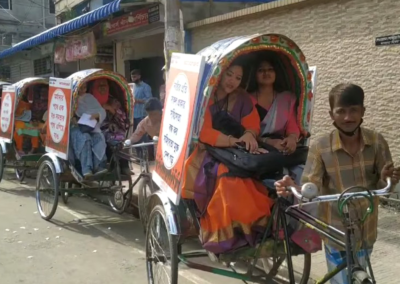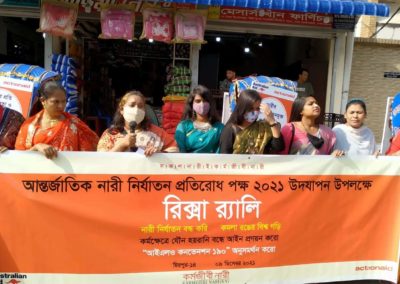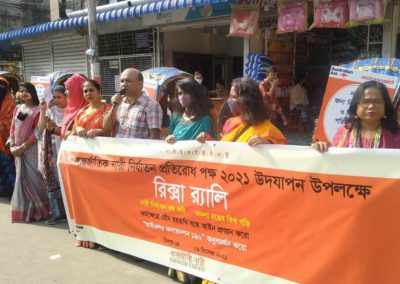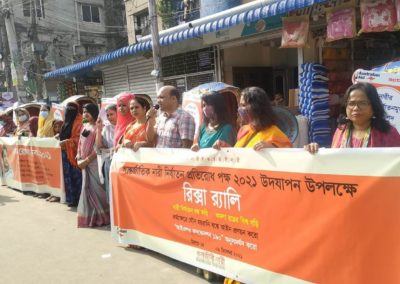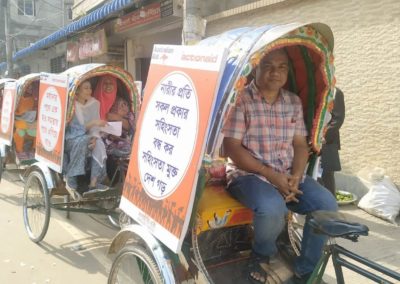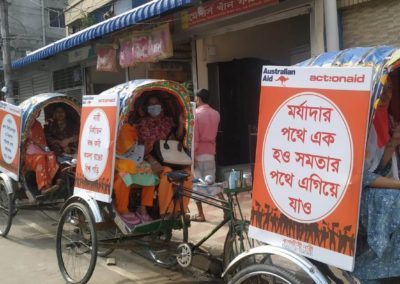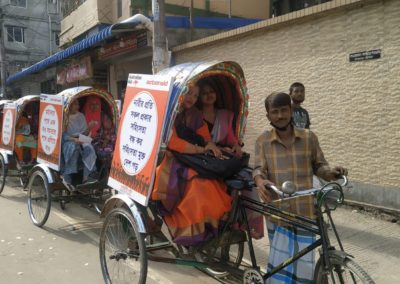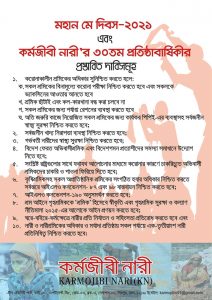News and Events
আন্তর্জাতিক নারী নির্যাতন প্রতিরোধ পক্ষ ২০২১ উদযাপন উপলক্ষে কর্মজীবী নারী’র রিক্সা র্যালি
Facebook Link: FB Text & Photo | FB Video
প্রেস বিজ্ঞপ্তি: গবেষণা বিষয়ক অনলাইন মতবিনিময় সভা
অপ্রাতিষ্ঠানিক খাতের নারীশ্রমিকদের অবদানকে তুলে ধরতে এবং তাদের অধিকার-মর্যাদা প্রতিষ্ঠার লক্ষে’ বিউটি পার্লার ও নন-ক্লিনিক্যাল স্বাস্থ্য সেবা কর্মীদের উপর পরিচালিত গবেষণার ওপর মতবিনিময় সভা অপ্রাতিষ্ঠানিক খাতে কর্মীদের কর্মসংস্থান সম্পর্কিত অধিকার আইন দ্বারা নিশ্চিত করতে হবে
নারী শ্রমিক কন্ঠ আজ ১১ নভেম্বর, ২০২১ বিকাল ৩.০০ ঘটিকায় অপ্রাতিষ্ঠানিক খাতে নারী শ্রমিকদের অবদানকে তুলে ধরা এবং এই খাতের নারী শ্রমিকদের অধিকার মর্যাদা প্রতিষ্ঠার লক্ষ্যে বিউটি পার্লার ও হাসপাতালের কর্মীদের ওপর কড়া গবেষণা এর ওপর অনলাইন মত বিনিময় সভার (Study Sharing Consultation) আয়োজন করে
KN_Care Economy Workers_Presentation | Post press release _Karmojibi Nari
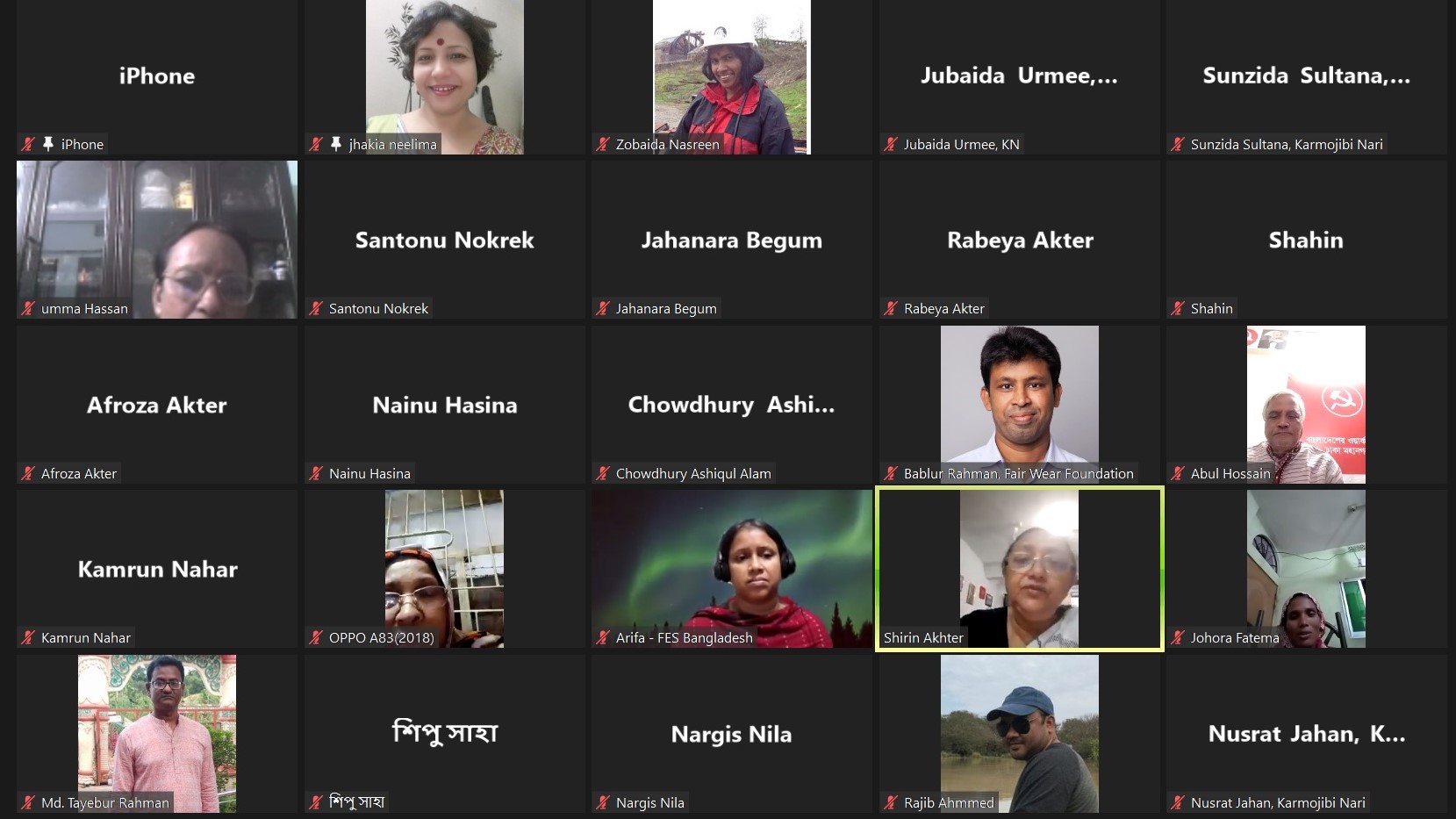
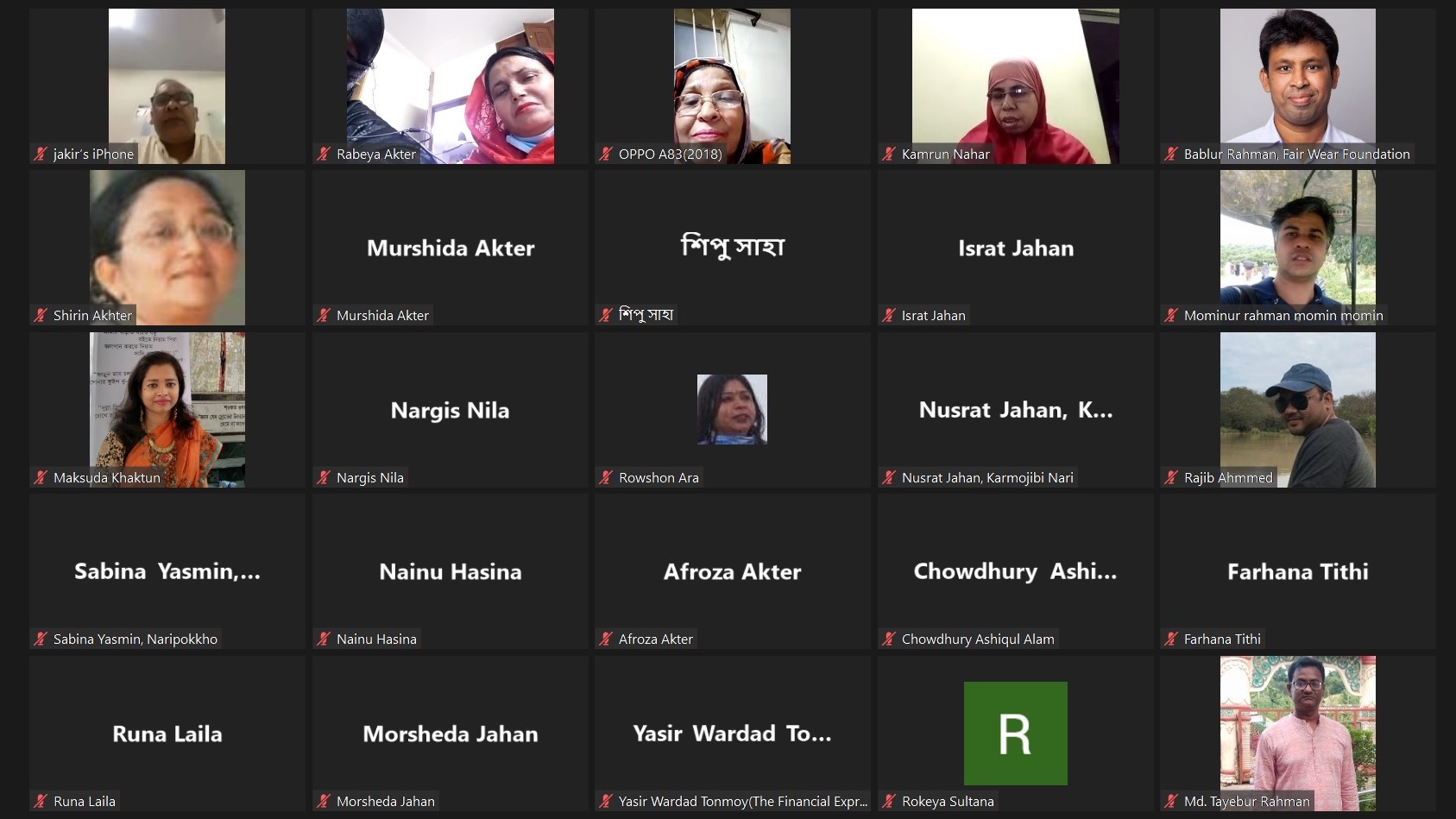
“কর্মক্ষেত্রে যৌন হয়রানি ও সহিংসতা প্রতিরোধে আইএলও কনভেনশন ১৯০ অনুস্বাক্ষর ও শ্রম আইনের সংশোধন” বিষয়ক: জাতীয় সংলাপ
Co-funded by the European Union | PDF
“কর্মক্ষেত্রে যৌন হয়রানি ও সহিংসতা প্রতিরোধে আইএলও কনভেনশন ১৯০ অনুস্বাক্ষর ও শ্রম আইনের সংশোধন”
বিষয়ক
জাতীয় সংলাপ
ধারণাপত্র
আমরা জানি, অর্থনীতির চাকা ঘোরে শ্রমিকের শ্রমে ও ঘামে। খাদ্যের নিশ্চয়তা, অর্থনীতিকে সচল রাখা, দেশকে স্ব-নির্ভর রাষ্ট্র হিসাবে গড়ে তোলার পেছনে আছে শ্রমজীবীদের অক্লান্ত পরিশ্রম যেখানে নারীশ্রমিকের অংগ্রহণ ক্রমশ: বাড়ছে। প্রাতিষ্ঠানিক এবং অ-প্রাতিষ্ঠানিক উভয়খাতে নারীশ্রমিকের সংখ্যা ক্রমাগত বৃদ্ধি পেলেও কর্মস্থলে নারীবান্ধব কর্মপরিবেশ নিশ্চিত করা যায় নি, প্রতিরোধ করা যায় নি কর্মক্ষেত্রে যৌন হয়রানি। অথচ আমরা জানি, কর্মক্ষেত্রে যে কোন ধরনের যৌন হয়রানি মানবাধিকারের সুষ্পষ্ট লঙ্ঘন ও উন্নয়নের ক্ষেত্রে একটি প্রতিবন্ধকতা।
কর্মজীবী নারী ২০১৯ সালে ‘তৈরি পোশাক কারখানায় নারীবান্ধব ও নিরাপদ কর্মপরিবেশ’ সংক্রান্ত এক গবেষণা পরিচালনা করে। এই গবেষণাটি ৩২৭ টি পোশাক কারখানার ৩,০১৪ জন নারী শ্রমিকদের সাথে পরিচালিত হয়। গবেষণায় দেখা গেছে, ৭২ শতাংশ নারী শ্রমিক মৌখিক হয়রানির এবং ৬২ শতাংশ নারী শ্রমিক মানসিক হয়রানির অভিযোগ করেছেন। এছাড়াও, ২১ শতাংশ নারী শ্রমিক শারীরিক হয়রানির এবং ১৪ শতাংশ নারী শ্রমিক যৌন হয়রানির শিকার হয়েছেন বলে জানিয়েছেন। প্রাতিষ্ঠানিক খাত – যেমন পোশাক শিল্পে কাজ করা শ্রমিকদের কর্মপরিবেশের এই চিত্র থেকে আমরা অনুমান করতে পারি অ-প্রাতিষ্ঠানিক খাতে কাজ করা নারীদের অবস্থা আরও ভয়াবহ, কারণ তাদের জন্য এখনো পযন্ত কোন আইনী কাঠামো গড়ে ওঠে নি।
লক্ষণীয় বিষয় এই যে, কর্মক্ষেত্রে নারীশ্রমিকের প্রতি সহিংসতা, হয়রানি এবং বৈষম্য একটি চলমান সমস্যা হলেও এই ঘটনাগুলি প্রায়ই প্রকাশিত হয় না। কারণ দরিদ্র নারীশ্রমিকরা আশঙ্কা করেন যে, তারা সহিংসতা ও হয়রানি বিষয়ে অভিযোগ করলে তাদের চাকরির নিরাপত্তা থাকবে না। বর্তমান মহামারী পরিস্থিতিতে এই আশঙ্কা আরও বেড়েছে, যেখানে বেঁচে থাকার প্রয়োজন শ্রমিকদের অধিকার উপেক্ষা করার যুক্তি হিসাবে ব্যবহৃত হয়। এই কারণে কর্মজীবী নারী এবং শ্রম অধিকার নিয়ে কাজ করে এমন প্রতিষ্ঠান ও অংশীদাররা মনে করে যে, কর্মক্ষেত্রে নারীর প্রতি যৌন হয়রানি প্রতিরোধে অধিকতর আইনি সুরক্ষার দাবী করার সময় এখনই।
কর্মক্ষেত্রে ও শিক্ষা প্রতিষ্ঠানে যৌন হয়রানি প্রতিরোধে ২০০৯ সালের ১৪ মে মহামান্য হাইকোর্ট সকল প্রতিষ্ঠানে যৌন হয়রানি প্রতিরোধ ও নিরাপত্তা নিশ্চিত করার জন্য ১১টি দফা সম্বলিত সুনিদির্ষ্ট নির্দেশনা প্রদান করেন যেগুলো প্রতিপালন করা সংশ্লিষ্ট প্রতিষ্ঠানগুলোর দায়িত্ব। অন্যদিকে ২০১৯ সালে আইএলও “কর্মক্ষেত্রে সহিংসতা ও হয়রানি নিরসন কনভেনশন-১৯০” (“ইলেমিনেশন অব ভায়োলেন্স এন্ড হেরাসমেন্ট ইন দি ওয়ার্ল্ড অব ওয়ার্ক” প্রণয়ন করে যা একটি যুগান্তকারী পদক্ষেপ হিসেবে বিবেচিত হচ্ছে। বাংলাদেশ সরকার এই কনভেনশনটি এখনো অনুস্বাক্ষর করেনি।
আমরা মনে করি, কর্মক্ষেত্রে যৌন হয়রানি প্রতিরোধে ২০০৯ সালের মহামান্য হাইকোর্টের নির্দেশনা অনুযায়ী শ্রম আইনের সংশোধন করা হবে নাকি কর্মক্ষেত্রে হয়রানি প্রতিরোধে নতুন একটি আইন প্রণয়ন করা হবে – এ বিষয়ে সরকারের পক্ষ থেকে একটি সুস্পষ্ঠ নীতিমালা ঠিক করা আজ সময়ের দাবী। একইসাথে বাংলাদেশ সরকারকর্তৃক আইএলও কনভেনশন ১৯০ অনুস্বাক্ষরেরদাবী আজ সকলের। কর্মক্ষেত্রে যৌন হয়রানী বন্ধে এই কনভেনশনটি বাংলাদেশ কর্তৃক গৃহীত হলে তা এই ক্ষেত্রে বাংলাদেশের প্রতিশ্রুতিকে জাতীয় ও আন্তর্জাতিক পর্যায়ে যেমন সুদৃঢ় করবে তেমনি বাংলাদেশ সরকারের ভাবমূর্তি আরো উজ্জ্বল করবে বলে আমাদের বিশ^াস ।
এই প্রেক্ষাপটে “কর্মক্ষেত্রে যৌন হয়রানি ও সহিংসতা প্রতিরোধে আইএলও কনভেনশন ১৯০ অনুস্বাক্ষর ও শ্রম আইনের সংশোধন” বিষয়ক একটি জাতীয় সংলাপের আয়োজন করা হয়েছে। এই সংলাপের উদ্দেশ্য হল:
➢ কর্মক্ষেত্রে যৌন হয়রানি প্রতিরোধে ২০০৯ সালের মহামান্য হাইকোর্টের নির্দেশনা বাস্তবায়নে সরকারের পক্ষ থেকে যেন একটা সুস্পট গাইডলাইন পাওয়া যায় সে বিষয়ে এবং
➢ বাংলাদেশ সরকার কর্তৃক আইএলও’র “কর্মক্ষেত্রে সহিংসতা ও হয়রানি নিরসন কনভেনশন-১৯০”-এর অনুস্বাক্ষর বিষয়ে সংলাপ
জাতীয় সংলাপটি কর্মজীবী নারী কর্তৃক ‘একতায় মর্যাদা’ – প্রকল্পের কার্যক্রমের আওতায় আয়োজিত হচ্ছে। প্রকল্পটি ইউরোপিয়ান ইউনিয়ন-এর আর্থিক সহযোগিতায় এবং টেরে ডেস হোমস ইটালিয়া, কর্মজীবী নারী ও সবুজের অভিযান ফাউন্ডেশন কর্তৃক বাস্তবায়িত হচ্ছে। এছাড়া এই সংলাপটি আয়োজনে সহযোগিতা করছে শ্রম অধিকার বিষয়ক দুটি নেটওয়ার্ক – শ্রমিক নিরাপত্তা ফোরাম (এসএনএফ) ও গৃহশ্রমিক অধিকার প্রতিষ্ঠা নেটওয়ার্ক (উডজঘ)।
উক্ত সংলাপে অলোচ্য বিষয়ে মতামত প্রদানের জন্য বিষয়সংশ্লিষ্ট নীতি নির্ধারক, শ্রম অধিকার বিষয়ক জাতীয় ও আন্তর্জাতিক প্রতিষ্ঠান/এজেন্সি, ট্্েরড ইউনিয়ন, গবেষক এবং মিডিয়া প্রতিনিধিদের আমন্ত্রণ জানানো হবে। আমরা আশা করছি আয়োজিত সংলাপের মাধ্যমে একদিকে অংশগ্রহণকারী ব্যক্তিবর্গ যেমন আইএলও কনভেনশন-১৯০ ও শ্রম আইনের সীমাবদ্ধতা সম্পর্কে জানতে পারবেন অন্যদিকে তাদের পরামর্শ ও সুপারিশের ওপর ভিত্তি করে আয়োজন সংস্থাসমূহ ভবিষ্যত কর্ম-পরিকল্পনা প্রণয়ন ও বাস্তবায়নে দিক নির্দেশনা পাবে। এছাড়া আইএলও কনভেনশন অনুসমর্থন ও বাস্তবায়নে এ সংলাপের মাধ্যমে একটি নির্দিষ্ট সুপারিশমালা প্রণীত হবে যা কার্যকর হলে কর্মক্ষেত্রে সকল প্রকার সহিংসতা ও হয়রানি বন্ধ হবে বলে আশা করা যায়।
সংলাপে অংশগ্রহণকারী ব্যক্তিবর্গের সংখ্যা: ৬০ জন
অংশগ্রহণকারী ব্যক্তিবর্গের ধরন: জাতীয় ও আন্তর্জাতিক উন্নয়ন সংস্থার ব্যক্তিবর্গ, ট্রেড ইউনিয়ন, সুশীল সমাজ এবং শ্রমিক প্রতিনিধি।
সংক্ষিপ্ত পরিচিতিসহ আয়োজক সংস্থাসমূহের নাম:
কর্মজীবী নারী: এটি বাংলাদেশের একটি অলাভজনক, বেসরকারি নারী- নেতৃত্বাধীন সংগঠন যারা ১৯৯১ সাল থেকে নারী ও নারীর অধিকার, মর্যাদা, ক্ষমতা এবং কর্তৃত্ব নিশ্চিত করার জন্য কাজ করছে। সংগঠনটি প্রাতিষ্ঠানিক ও অ-প্রাতিষ্ঠানিক খাতে কর্মরত নারীদের সংগঠিত করা, সচেতন করা ও নেতৃত্ববিকাশে উদ্যোগ নিয়ে থাকে। নারী ও নারীশ্রমিক বিষয়ে গবেষণা পরিচালনা করে থাকে এবং শ্রমিক অধিকার বিষয়ে সরকার, নীতি নির্ধারক ও সংশ্লিষ্ট সকল পক্ষের সাথে অ্যাডভোকেসি করে থাকে।
সবুজের অভিযান ফাউন্ডেশন: সংস্থাটি ২০০৫ সাল থেকে সুবিধাবঞ্চিত নারী ও শিশুদের সন্তানদের জন্য পড়াশোনা, চিকিৎসা, দিবাযত্নকেন্দ্র, কমিউনিটি উন্নয়ন ইত্যাদি পরিসেবা নিশ্চিত করার মাধ্যমে সুবিধাবঞ্চিতদের জন্য কাজ করে যাচ্ছে।
টেরে ডেস হোমস ইতালিয়া: এটি একটি আন্তর্জাতিক সংস্থা যা বাংলাদেশে ১৯৯৬ সাল থেকে স্থানীয় অংশীদারদের সাথে নিয়ে কাজ করছে। টিডিএইচ ইতালিয়া-এর প্রকল্পগুলি মূলত কিশোর -কিশোরীদের ক্ষমতায়ন এবং সুরক্ষা, নিরাপদ অভিবাসন, শ্রমিকদের অধিকার এবং সুবিধাবঞ্চিত শিশু ও কিশোর-কিশোরীদের শিক্ষাগত সহায়তা সংক্রান্ত বিষয় নিয়ে কাজ করে থাকে।
গৃহশ্রমিক অধিকার প্রতিষ্ঠা নেটওয়ার্ক (Domestic Worker’s Rights Networks (DWRN): ২০০৬ সালে প্রতিষ্ঠিত একটি নাগরিক সামাজিক প্ল্যাটফর্ম যা গৃহকর্মীদের অধিকার সুরক্ষার পক্ষে কাজ করে এবং শ্রম আইনের আওতায় গৃহকর্মীদের অন্তর্ভুক্ত করার জন্য কাজ করে। পাশাপাশি সংশ্লিষ্ট সকল শক্তিকে একত্রিত করে সচেতনতা সৃষ্টির মাধ্যমে জোরালো আওয়াজ তুলে শ্রমিকদের নিজেদের মধ্যে সংগঠিত করে এবং তাদের অধিকার আদায়েরজন্য সোচ্চার কণ্ঠস্বর।
শ্রমিক নিরাপত্তা ফোরাম (Workers’ Safety Forum (SNF): ২০০৫ সালে জাতীয় পর্যায়ের মানবাধিকার সংগঠন, জাতীয় ট্রেড ইউনিয়ন ফেডারেশন, শ্রমিক অধিকার ও পরিবেশ নিয়ে কর্মরত উন্নয়ন সংস্থার সম্মিলিত প্লাটফর্ম হিসেবে প্রতিষ্ঠিত। শ্রমবান্ধব নিরাপদ কর্মক্ষেত্র নিশ্চিত করা এবং কর্মক্ষেত্রের দুর্ঘটনায় নিহত শ্রমিকের ক্ষতিগ্রস্ত পরিবার ও আহত শ্রমিকদের উপযুক্ত চিকিৎসা, ক্ষতিপূরণ ও পুনর্বাসনসহ ক্ষতিগ্রস্ত শ্রমিকদের ন্যায়বিচার প্রাপ্তি ও তাদের সহায়তাকল্পে ‘শ্রমিক নিরাপত্তা ফোরাম-এসএনএফ’ ভুমিকা রাখছে। এছাড়া সবার জন্য নিরাপদ কাজ এই লক্ষ্য নিয়ে ‘শ্রমিক নিরাপত্তা ফোরাম’ সরকার, নীতি নির্ধারক ও কারখানার মালিকদের সংগঠন/সমিতিসহ সংশ্লিষ্ট সকল পক্ষের সাথে অ্যাডভোকেসি, জনমত গঠন এবং বিভিন্ন দুর্ঘটনায় ক্ষতিগ্রস্ত শ্রমিকদের সহায়তা প্রদানে কাজ করছে।
Gender-based violence and harassment in the world of work: evaluating the laws in Bangladesh in light of the mandates of ILO Convention 190
Co-funded by the European Union | PDF
Context
Violence and harassment in the world of work, in particular, gender-based violence and harassment (GBVH) affects women and girls disproportionately and wreaks negative impacts on their effective participation in the workforce, education and public life – thereby reinforcing gender inequality. Although violence and harassment in workplaces have been a reality for many years across the globe, there were no binding international instruments prohibiting or requiring states to effectively address workplace violence and harassment. It was only in June 2019 that the General Conference of the International Labor Organization (ILO) adopted the Violence and Harassment Convention, 2019 (Convention No. 190) . The Convention calls on all ILO members to adopt “an inclusive, integrated and gender-responsive approach for the prevention and elimination of violence and harassment”, taking a broad definition of “the world of work” applied to all sectors. The Convention speaks of legal prohibition on violence and harassment and emphasizes that the ratifying members should establish and strengthen enforcement and monitoring mechanisms, ensure access to remedies and support for victims, and provide for sanctions.
In the context of Bangladesh, GBVH in workplaces are common in all sectors – formal and informal. Although empirical evidence on the prevalence of GBVH in workplaces is relatively little, ample evidence exists of violence against women in general. The most recent official survey on violence against women in Bangladesh, undertaken in 2015, found that almost two-thirds (72.6 per cent) of women who are, or have ever been, married have experienced some form of violence by an intimate partner.
In recent years, a number of organizations (national and international non-governmental organizations) have conducted surveys on workplace conditions of women in Bangladesh. A study by the Shojag (‘Awaken’) Coalition found that 22 per cent of women garment workers in Bangladesh have been exposed to physical, psychological and sexual harassment – either in the workplace, or on their way to and from work. A survey by the Bangladesh Institute of Labour Studies (BILS) found that 12 women working in various sectors were raped, 12 were gang-raped and 62 were murdered between April and June 2019. A 2019 study by Karmojibi Nari collected data from 1,002 garment workers in 113 factories. Among them, 63 per cent of women workers reported experiencing verbal harassment and 60.7 per cent reported psychological harassment. In addition, 23.6 per cent of workers reported physical harassment and 10.8 per cent reported suffering sexual harassment. Incidents of violence and harassment are also frequently reported in relation to domestic workers.
The legal framework for eliminating violence and harassment in the world of work in Bangladesh is also very weak and lacks basic elements of protection and prevention. Convention No. 190, which recognizes the right of everyone to a world of work free from violence and harassment, including GBVH, is thus an essentially relevant benchmark against which the gaps and loopholes in the present laws need to be examined.
International legal framework
In addition to C190, a range of international instruments and norms address GBVH in the workplace in varying degrees. General instruments, such as the Universal Declaration of Human Rights, International Covenant on Economic, Social and Cultural Rights and the International Convention on the Elimination of All Forms of Racial Discrimination each recognize the ‘right to just and favorable conditions of work.’ General Comment no. 23 (2016) on article 7 of International Convention on the Elimination of All Forms of Racial Discrimination views freedom from violence and harassment, including sexual harassment, as a way of ensuring just and favorable conditions for work and states that national policy and definitions should be implemented to meet these goals. Of particular relevance to gender-based violence at the workplace is the United Nations Convention on the Elimination of All Forms of Discrimination against Women 1979 (CEDAW) and General Recommendation No.19, which recognizes how equality in the workplace is impaired when women are subjected to GBV, such as sexual harassment, in the workplace.
Building upon these general instruments, several other specific measures and recommendations aimed at addressing workplace violence and harassment have since been introduced by the ILO and other occupational health organizations. The ILO Discrimination (Employment and Occupation) Convention, 1958 (No. 111) addresses discrimination on a number of grounds, including sex, and requires member states to declare and pursue national policies designed to promote equality of opportunity and treatment with a view to eliminating discrimination. In 2002, the ILO’s Governing Body published ‘The Code of Practice on Workplace Violence in Services Sectors and Measures to Combat This Phenomenon,’ a non-binding set of guidance on addressing workplace violence. The Code defines workplace violence as “any action, incident or behavior that departs from reasonable conduct in which a person is assaulted, threatened, harmed, injured in the course of, or as a direct result of, his or her work,” including harassment, and provides information on action against workplace violence such as implementing policy, risk identification and prevent, training, mitigation measures and monitoring.
The International Commission on Occupational Health also set out a guide which encourages employers to adopt ‘anti-violence’ policies which prohibit a wide nature of physical and verbal abuse and harassment. Another relevant framework is that of the Occupational Safety and Health Convention 1981 (No. 155) and its Recommendation (No. 164). The Convention views health at work as including physical and mental elements which directly relate to safety and hygiene at work and requires states to formulate, implement and periodically review national policy on occupational health services.
Bangladesh participates in various international fora and has ratified the key international human rights treaties as discussed above that focus on protecting women’s rights. At the global level, Bangladesh has thus clearly demonstrated its commitment to ending gender-based violence in all spheres of life, as envisaged in its Constitution.
National legal framework and key gaps in preventing and addressing GBVH in light of the mandates of C190
Overview of the legal framework
The key law that regulates the formal work sector is the Bangladesh Labour Act 2006 (BLA). The BLA has no mention of violence and harassment at workplaces, neither sexual harassment has been addressed anywhere. The informal sector on the other hand is beyond any regulatory framework and this is where majority of the women workforces are employed. The Bangladesh Labor Rules, 2015 (BLR) framed under the BLA also does not have any supplementing rule to section 332, which further weakens implementation of the provision. The EPZ Labour Act, 2019 (EBZ Act) , also contains a provision identical to section 332 of the BLA in section 189. Similar to BLA, this section is clogged with vague and outdated provisions.
The applicable criminal laws that address GBV generally are also clogged with inconsistencies and antiquated provisions and are poorly enforced. The term, ‘sexual harassment’ is also not mentioned or defined anywhere in the criminal laws. The only legal document that dealt with sexual harassment at workplaces is a guideline issued by the High Court Division (HCD) of the Supreme Court of Bangladesh (SC) in 2009 in response to a public interest litigation filed by women rights based NGO. In the 2009 judgment the Supreme Court itself had highlighted the lacuna in the existing laws in defining or criminalizing sexual harassment and had asked the appropriate authorities to enact laws to effectively protect women from sexual harassment at workplaces.
Key gaps in the laws
- Laws do not define or prohibit violence and harassment
Prohibiting violence and harassment in law is considered as one of the key indicators of an inclusive, integrated and gender-responsive approach that the Member states are mandated to adopt within the core principles of C190. The BLA does not provide any definition of violence and harassment, neither it contains provision that explicitly prohibits such acts. Although section 332 faintly describes certain acts in the nature of sexual harassment against women, the term ‘sexual harassment’ is again not defined or addressed anywhere. The wordings used in the section are also vague and outmoded. Words like modesty and honor of the women has the effect of placing emphasis on the character of the victim instead of focusing on the wrongful act itself. The definition of sexual harassment given in the 2009 Guideline does not define the nature of the act itself but only provides a list of examples that can be considered as sexual harassment. Moreover it is limited in scope in comparison to the definition provided in the C190. - Lack of legal provision addressing prevention
Article 9 of the Convention requires member states to adopt appropriate laws and regulations that require employers to take certain measures to protect and prevent workers against violence and harassment at the world of work. In the context of Bangladesh, there is no law requiring employers to adopt such measures in terms of addressing violence and harassment at workplaces. Neither the BLA nor the Rules under the BLA contain any such provision. Absence of effective remedies - Lack of provisions for effective legal remedies
In terms of legal protection, the Convention emphasizes on measures to ensure effective remedies in case of violence and harassment in the world of work. In Bangladesh, legal forum for such remedies is largely absent. As far as the BLA goes, the remedy for an offence under section 332, is a nominal penalty of imprisonment for up to 3 months or fine up to Taka 25000 and the forum for filing the case is the Labour Courts. The 2009 Guideline although proposes sanctions for perpetrators of sexual harassment at workplaces, there is no specific mention of possible remedies to be made available to the aggrieved person. Studies suggest there are also very few establishments where internal complaint committees as required by the HCD Guideline, have been formed or are functioning properly. There is also currently no external dispute resolution mechanism as mandated by the C190. - Poor enforcement of laws
Article 10 of the Convention requires all Members to take appropriate measures to monitor and enforce national laws and regulations regarding violence and harassment in the world of work. However, implementation of the GBVH related laws in Bangladesh is extremely weak. In cases related to violence against women, instances of conviction are extremely low compared to a high rate of acquittal. Effective enforcement of the labour laws again, is a challenge, and continuing non-compliance is a key driver of violence and harassment in the world of work in the context of Bangladesh. - Absence of violence and harassment in OSH management
C190 places significant importance in including measures against violence and harassment within the management of occupational safety and health (OSH). However, the policies and practices in the context of Bangladesh generally overlook violence and harassment issues in the OSH management. Although the National Occupational Health and Safety Policy was adopted in 2013, the policy does not specifically address violence and harassment in any places. The general understanding of OSH is predominantly confined to workers’ deaths, occupational injuries or occupational diseases. - Weak inspection
Article 10 of the Convention specifically require member states to take appropriate measures to ensure that labour inspectorates and other relevant authorities are empowered to deal with violence and harassment in the world of work, ‘including by issuing orders requiring measures with immediate executory force, and orders to stop work in cases of an imminent danger to life, health or safety. The Department of Factory Inspection (DIFE) does not have any executive authority to directly take any action against such breach and the only remedy against such breach is to lodge a complaint in the Labour Court. Apart from lack of resources and manpower, DIFE officials are also not specifically trained to respond to or address GBVH in the workplaces. - Lack of Protection against domestic violence
The Convention specifically mandates the states to take appropriate measures to recognize the effects of domestic violence and, so far as is reasonably practicable, mitigate its impact in the world of work. However, the laws addressing domestic violence in Bangladesh do not provide adequate protection for victims and has little reference to the link between domestic violence and world of work. The Domestic Violence (Prevention and Protection) Act 2010 does not include provisions that stipulate employers’ obligation to mitigate the negative impacts of domestic violence in the world of work. - Laws do not extend to informal sector
In the context of Bangladesh, the formal procedural and substantive labour law provisions do not apply to the informal sectors. The 2009 Guideline also did not include informal sector within its scope as disused in the previous sections. Among the various sectors of informal economy, the domestic workers employed in household works need particular attention, as they are particularly vulnerable to violence, and prolonged hours of work because of lack of any regulatory protection. The Government of Bangladesh formulated the Domestic Workers Protection and Welfare Policy in 2015. However, there has not been much effort to implement this policy since 2015 and the said monitoring cells also have not been formed. - Absence of anti-discrimination laws
Elimination of discrimination in respect of employment and occupation is recognized as one of the core principles of the Convention. There is no law currently in force in Bangladesh to prohibit or ensure protection against discrimination. The BLA does not have any specific reference to actions against discrimination. There was however a draft Anti-Discrimination Bill formulated by the National Human Rights Commission in 2013 but the draft has not been successful in achieving a stronger support in favor of its enactment and it is still awaiting legislative review. - Lack of awareness
C190 gives a clear emphasis on the need for trainings on violence and harassment. However studies indicated that there is a general lack of clarity especially as to what constitutes sexual harassment among the key stakeholder including workers and employers. Issues like non-payment of wages, unlawful dismissal, irregular work hour, etc. are more often given priority by the relevant stakeholders, over issues of violence and harassment.
Recommendations
- In light of the core mandates of C190, Section 332 should complaint mechanism including investigation, appeal, terms of complaint committee members etc.
- In addition to providing an internal grievance mechanism, GBVH should also be considered as an offence triable by the Labour Courts, for which adequate penal sanction should be specified in place of the nominal punishment provided in the current section of 332. The penal sanction may include fine to be paid to the aggrieved complainant as compensation for the injury. The BLR should add simplified rules detailing procedures for filing a case under such provision as well as for execution of any order received.
- Also, with regard to the Bangladesh EPZ Labour Act 2019 , where a provision similar to section 332 exists i.e. section 189, similar reform needs to be brought, to define GBV and sexual harassment, as well as to provide mechanism for complaint and sanction.
- To ensure a violence and harassment free workplace for all it is essential that the existing laws should effectively protect workers against GBVH both within and outside the world of work. As such, laws relating to rape, sexual assault, domestic violence and other gender-based violence need to be reviewed to accommodate the global developments and to ensure effective protection of workers from GBVH even beyond the world of work.
- The 2009 guideline had contemplated enactment of such a law and had only made its directives legally binding for the interim period till such legislation comes into effect. Keeping that spirit of the HCD guideline it is crucial that the relevant stakeholders proactively take action towards promulgation of a separate law against sexual harassment at workplaces. An inter-ministerial task force can lead such an effort of drafting the law. At the same time, it is critical to form alliance with CSO, workers and employers’ organizations and development partners to assist and guide the task force.
- In the absence of specific legislation to address sexual harassment, it is important to effectively enforce the Guideline in the world of work, and to monitor its enforcement. To do so, an enforcement and monitoring mechanism should be set up – the absence of such mechanism is a major reason that the guideline is not currently well-implemented. The Ministry of Labour and Employment (MoLE) can play an essential role in developing such an enforcement and monitoring mechanism for workplaces by forming a national level monitoring body in consultation and coordination with other government entities, employers’ and workers’ organizations, CSO representatives and other relevant stakeholders. Monitoring should include regular reporting by workplaces to the committee, as well as regular audits of workplaces.
- In light of the C190 provisions, the government should require all employers to adopt internal organizational policy against violence and harassment, reflecting the key provisions of the 2009 Guideline. Since the HCD Guideline has not provided details on certain procedural aspects, such organization-specific policy can address the detail procedural guidelines which can, in turn, ensure successful implementation of the 2009 Guidelines. Until legislation is enacted that requires employers to adopt such policy, MoLE can issue circulars to all concerned establishments to that effect. Learning from other jurisdictions, MoLE can also initiate to develop a model policy framework or code of conduct to be attached with the proposed circular. Development partners, CSOs and entities like National Human Rights Commission of Bangladesh (NHRC), can also assist the government in developing such model policy.
- It is essential to include violence and harassment, in particular GBVH, as a hazard in all health and safety codes in Bangladesh. The Occupational Health and Safety Policy of 2013 should specifically include violence and harassment including GBVH, in workplaces, taking guidance from the provisions of the C190 and R206. At the same time, the current efforts towards formulating a national action plan for OSH should essentially consider including GBVH as an occupational hazard and should require the employers to mitigate psychosocial risks associated with workplace violence and harassment.
- In order to ensure that the employers comply with the labour regulations for introducing preventive measures and complaint mechanisms against violence and harassment including GBVH, at their workplaces, it is crucial to strengthen the capacity and authority of the DIFE inspectors. MoLE should consider developing training modules, a specific violence and harassment related checklist, and other guidelines and resources for inspection on harassment and other forms of violence at work.
- The legal authority of the DIFE inspectors under the BLA needs to be reviewed. Amendments to BLA may be considered to expand power of the inspectors to issue interim orders towards employers where they find cases of actual risk of workplace violence and harassment.
- The Domestic Violence (Prevention and Protection) Act and it 2013 Rules should be reviewed to incorporate provisions requiring employers to ensure measures to mitigate the impacts of domestic violence in the world of work, so far as practicable. At the same time, the other relevant laws, policies and action plans should incorporate provisions having focus on mitigating impact of domestic violence at the world of work.
- Intersecting grounds of discrimination, such as race, disability and ethnicity are often considered as risk factors for workplace GBVH. GBVH in the world of work thus should be defined and prohibited in Bangladesh’s anti-discrimination law, to ensure appropriate safeguards. The draft anti-discrimination bill proposed by the National Human Rights Commission should be reviewed to ensure the inclusion of these dimensions. At the same time, advocacy efforts should be consolidated and strengthened to create a robust lobbying group able to influence law-makers for the enactment of this law.
- Efforts to prevent workplace GBVH through legal reforms and advocacy must design ways to ensure that informal workers are covered by institutional protection and can seek redress. This is crucial when proposing a special law prohibiting GBVH in the world of work especially in light of the provisions of C190.
- Labour inspectors, judges of the Labour Courts and Labour Appellate Tribunals, workers and employers need to be provided with training on identifying risks of violence and harassment, understanding laws related to violence and harassment, and effectively responding to cases of violence and harassment. The Directorate of Labour, under the Ministry of Labour and Employment, should consider designing training programs for these stakeholders, in consultation or partnership with development organizations and CSOs.
- C190 requires members to provide safe, fair and effective reporting and dispute resolution mechanisms and procedures in cases of violence and harassment in the world of work that includes providing dispute resolution mechanisms external to workplace. In several countries also, recourse to such external procedures other than courts or tribunals exist, where internal workplace dispute resolution procedures do not lead to a satisfactory result for either party. In Bangladesh, similarly the government can consider forming an independent body or commission where employees of all sectors can directly refer a complaint to the authorities for a non-judicial resolution of the dispute. The BLA or a separate legislation on workplace GBVH can include provisions for establishing such Commission defining its roles and responsibilities. Considering that the existing Labour Courts and Tribunals are often clogged with pending cases with consequent delay in disposal, such an alternative dispute resolution mechanism may prove to be an effective and unbiased forum for employees of all sectors.
Conclusion
A healthy work environment free of violence and harassment would not only benefit the workers but would also prove to be beneficial for the employers as it contributes to increased productivity. As such, while ways to amend the existing laws, enacting new laws, and enhancing capacity of the key implementing stakeholders can be explored and evaluated, ratifying the ILO Convention 190 is essential. Ratification to C190 would surely provide a strong foundation for the overall reform efforts to ensure an effective legal and policy framework addressing GBVH at workplaces.
৩০তম প্রতিষ্ঠাবার্ষিকীর প্রস্তাবিত দাবিসমূহ
মহান মে দিবস-২০২১ এবং কর্মজীবী নারী’র ৩০তম প্রতিষ্ঠাবার্ষিকীর প্রস্তাবিত দাবিসমূহ
শুভেচ্ছা কার্ডটা
Eid-Ul-Fitr 2020 Message
The people of every corner of the earth are fighting COVID-19 for survival. This time demands much more solidarity of the people than exchanging Eid greetings! In advancing world the working people are playing the most crucial role, but they are now living with discrimination! PDF
Invitation From Theater Art Unit
প্রিয় সুধী
নাট্যকার নির্দেশক এস এম সোলায়মানের ১৮ তম প্রয়াণ ও ৬৬তম জন্মদিবস উপলক্ষে থিয়েটার আর্ট ইউনিট আগামী ২৭ সেপ্টেম্বর, নীলিমা ইব্রাহিম, মহিলা সমিতি মিলনায়তনে এবং ২৮ সেপ্টেম্বর ২০১৯, বাংলাদেশ শিল্পকলা একাডেমির স্টুডিও থিয়েটার হলে এস এম সোলায়মান প্রণোদনা প্রদান ও স্মারকবক্তৃতা এবং এস এম সোলায়মান এর রচনা ও নির্দেশনায় নাটক “কোর্ট মার্শাল” শো ২০১৯ আয়োজন করা হয়েছে।
প্রণোদনা স্মারক গ্রহন করবেন প্রতিভাবান ও সৃজনশীল তরুন নাট্যপ্রাণ জুলফিকার চঞ্চল। স্মারক বক্তৃতা করবেন ড. দেবজিত্ বন্দ্যোপাধ্যায়।
অনুষ্ঠানে সম্মানিত অতিথি হিসেবে উপস্থিত থাকবেন কবি কামাল চৌধুরী।
উক্ত অনুষ্ঠানে আপনাদের একজন রির্পোটার ও ক্যামেরা ম্যানকে পাঠানো ও একটা নিউজ করার জন্য অনুরোধ করছি।
ইয়াসমিন হত্যার ২৪ বছর
প্রেস বিজ্ঞপ্তি
তারিখ: ২৩/০৮/২০১৯
ইয়াসমিন হত্যার ২৪ বছর
আসুন ধর্ষণ-নিপীড়ন-সহিংসতা প্রতিরোধে সর্বত্র সম্মিলিত আন্দোলন গড়ে তুলি – শিরীন আখতার এমপি
২৪ আগস্ট ২০১৯ গৃহশ্রমিক ইয়াসমিন হত্যার ২৪ বছর। ইয়াসমিনকে স্মরণ করে এবং নারী ও শিশু নির্যাতনের ভয়াবহতায় উদ্বেগ প্রকাশ করে ‘কর্মজীবী নারী’ ২৩ আগস্ট ২০১৯ শুক্রবার শাহবাগের জাতীয় জাদুঘরের সামনে নারীশ্রমিক জমায়েতের আয়োজন করে। ‘ইয়াসমিন হত্যার ২৪ বছর: ধর্ষণ-নিপীড়ন-সহিংসতা প্রতিরোধে সর্বত্র সম্মিলিত আন্দোলন গড়ে তুলি’-এই প্রতিপাদ্যকে সামনে রেখে নারীশ্রমিক জমায়েতে ‘কর্মজীবী নারী’ নারী ও শিশু নির্যাতন বন্ধে সকলকে এগিয়ে আসার আহ্বান জানান। সমাবেশে কর্মজীবী নারী’র নির্বাহী পরিচালক রোকেয়া রফিক এর সভাপতিত্বে প্রধান অতিথি হিসেবে বক্তব্য রাখেন কর্মজীবী নারী’র প্রতিষ্ঠাতা সভাপতি শিরীন আখতার এমপি। সমাবেশে সংহতি জানিয়ে বক্তব্য রাখেন: জাতীয় গার্হস্থ্য নারীশ্রমিক ইউনিয়নের সাধারণ সম্পাদক মুর্শিদা আখতার, প্রগতিশীল গার্মেন্টস শ্রমিক ফেডারেশন এর সভাপতি শিরীন সিকদার, গার্মেন্টস নেত্রী শেখ শাহনাজ প্রমুখ। সমাবেশ পরিচালনা করেন কর্মজীবী নারী’র সমন্বয়ক রাজীব আহমেদ। read more…
সিডও সনদ বাস্তবায়নে পোশাক শিল্প কারখানায় নারীর জন্য নিরাপদ ও নারীবান্ধব কর্মপরিবেশ বিষয়ে গবেষণা হতে প্রাপ্ত ফলাফলসমূহ শ্রমিকদের অবহিত করার লক্ষ্যে নারীশ্রমিক জমায়েত
“আগামী জুন মাসের বাজেটে নারীর ঘরের কাজের স্বীকৃতি এবং জিডিপিতেও তার মূল্য অন্তর্ভুক্ত করা হোক”
-শিরিন আখতার এমপি.
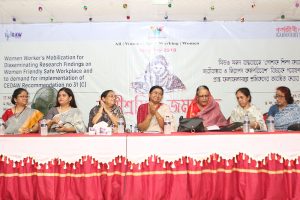 আজ ১৭ মে ২০১৯ কর্মজীবী নারীর উদ্যোগে ‘সিডও সনদ বাস্তবায়নে পোশাক শিল্প কারখানায় নারীর জন্য নিরাপদ ও নারীবান্ধব কর্মপরিবেশ বিষয়ে গবেষণা হতে প্রাপ্ত ফলাফলসমূহ শ্রমিকদের অবহিত করার লক্ষ্যে নারীশ্রমিক জমায়েত’ শীর্ষক একটি সভা অনুষ্ঠিত হয় ৪ নং ওয়ার্ড কমিউনিটি সেন্টার, মিরপুর- ১৩ ঢাকা। উক্ত সভায় প্রধান অতিথি হিসেবে উপস্থিত ছিলেন শিরীন আখতার এম.পি। রায় রমেশের মৃত্যুতে কর্মজীবী নারীর শোক প্রকাশ ও শ্রদ্ধা নিবেদন এর মাধ্যমে শুরু হওয়া এই সভায় কর্মজীবী নারীর নির্বাহী পরিচালক (ভারপ্রাপ্ত) সিতি সালমা খান স্বাগত বক্তব্য রাখেন। আরো বক্তব্য রাখেন জাতীয় শ্রমিক জোট বাংলাদেশ এর সহ সাংগঠনিক সম্পাদক (কেন্দ্রীয় কমিটি) শাহীন আক্তার পারভীন, কর্মজীবী নারীর নির্বাহী কমিটির সদস্য এবং সাবেক সাংসদ সদস্য রাফিয়া আক্তার ডলি এবং ধারণা পত্র পাঠ করেন কর্মজীবী নারী’র পরিচালক সানজিদা সুলতানা। অনুষ্ঠানটির সভাপতিত্ব করেন কর্মজীবী নারীর সভাপতি ড. প্রতিমাপাল-মজুমদার।
আজ ১৭ মে ২০১৯ কর্মজীবী নারীর উদ্যোগে ‘সিডও সনদ বাস্তবায়নে পোশাক শিল্প কারখানায় নারীর জন্য নিরাপদ ও নারীবান্ধব কর্মপরিবেশ বিষয়ে গবেষণা হতে প্রাপ্ত ফলাফলসমূহ শ্রমিকদের অবহিত করার লক্ষ্যে নারীশ্রমিক জমায়েত’ শীর্ষক একটি সভা অনুষ্ঠিত হয় ৪ নং ওয়ার্ড কমিউনিটি সেন্টার, মিরপুর- ১৩ ঢাকা। উক্ত সভায় প্রধান অতিথি হিসেবে উপস্থিত ছিলেন শিরীন আখতার এম.পি। রায় রমেশের মৃত্যুতে কর্মজীবী নারীর শোক প্রকাশ ও শ্রদ্ধা নিবেদন এর মাধ্যমে শুরু হওয়া এই সভায় কর্মজীবী নারীর নির্বাহী পরিচালক (ভারপ্রাপ্ত) সিতি সালমা খান স্বাগত বক্তব্য রাখেন। আরো বক্তব্য রাখেন জাতীয় শ্রমিক জোট বাংলাদেশ এর সহ সাংগঠনিক সম্পাদক (কেন্দ্রীয় কমিটি) শাহীন আক্তার পারভীন, কর্মজীবী নারীর নির্বাহী কমিটির সদস্য এবং সাবেক সাংসদ সদস্য রাফিয়া আক্তার ডলি এবং ধারণা পত্র পাঠ করেন কর্মজীবী নারী’র পরিচালক সানজিদা সুলতানা। অনুষ্ঠানটির সভাপতিত্ব করেন কর্মজীবী নারীর সভাপতি ড. প্রতিমাপাল-মজুমদার।
প্রধান অতিথির বক্তব্যে শিরীন আখতার এমপি. সিডও সনদে নারীর অধিকার ও মর্যাদার কথা বলা হয়েছে উল্লেখ করে নারীর ঘরের কাজের মূল্য যেন আগামী জুন মাসের বাজেটে অন্তর্ভুক্ত করা হয় এবং জিডিপি তে নারীর কাজের মূল্য অন্তর্ভুক্ত করার দাবি জানান। সম্প্রতি নুসরাত ও তানিয়ার সাথে ঘটে যাওয়া ঘটনার কথা বর্ণনা করে তিনি নারীর উপর সকল ধরণের নির্যাতন এর জন্য দৃষ্টান্তমূলক শাস্তি দাবি করেন। নারী শ্রমিকদের উদ্দেশ্যে তিনি বলেন আজ আমাদের ঐক্যবদ্ধ হতে হবে, একদিকে কারখানায় কাজ করবো, আরেকদিকে নিজের মর্যাদা বাড়াবো, একদিকে কারখানায় কাজ করবো, আরেকদিকে নায্য মজুরির দাবি করবো, ওভারটাইমের জন্য লড়াই করবো, সুন্দর জীবন গড়বো।
বক্তব্যে শাহীন আখতার পারভীন বলেন, দীর্ঘ ২৭ বছর ধরে কর্মজীবী নারী নারীশ্রমিকের সমঅধিকার ও সমমর্যাদার জন্য কাজ করছে, তারই প্রেক্ষিতে তিনি বলেন, একজন শ্রমিক কাজ করবে মর্যাদার সাথে নিরাপদ কর্মপরিবেশে।
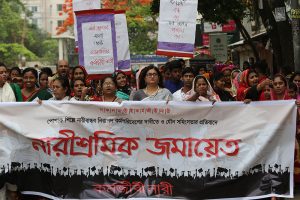 রাফিয়া আক্তার ডলি তার বক্তব্যে বলেন, অভিবাসী শ্রমিক এবং বাংলাদেশের গার্মেন্ট শ্রমিকদের আয়ের উপরেই এই দেশ মধ্যম আয়ের দেশে পরিণত হয়েছে। তিনি সিডও সনদের দাবি এবং কর্মজীবী নারীর দাবি বাস্তবায়নের উপর জোর দিয়ে শ্রমিকদের একত্রিত হওয়ার আহ্বান জানান। বাংলাদেশের সব আন্দোলন শ্রমিক আন্দোলন দিয়ে শুরু হয়েছে বলে উল্লেখ করে তিনি শ্রমিকের উদ্দেশ্যে বলেন, তাদের দায়িত্ব হলো শ্রমের ন্যায্য মূল্য বুঝে নেওয়া। তিনি তাদেরকে সংঘবদ্ধভাবে ট্রেড ইউনিয়ন গড়ে তোলার আহ্বান জানান।
রাফিয়া আক্তার ডলি তার বক্তব্যে বলেন, অভিবাসী শ্রমিক এবং বাংলাদেশের গার্মেন্ট শ্রমিকদের আয়ের উপরেই এই দেশ মধ্যম আয়ের দেশে পরিণত হয়েছে। তিনি সিডও সনদের দাবি এবং কর্মজীবী নারীর দাবি বাস্তবায়নের উপর জোর দিয়ে শ্রমিকদের একত্রিত হওয়ার আহ্বান জানান। বাংলাদেশের সব আন্দোলন শ্রমিক আন্দোলন দিয়ে শুরু হয়েছে বলে উল্লেখ করে তিনি শ্রমিকের উদ্দেশ্যে বলেন, তাদের দায়িত্ব হলো শ্রমের ন্যায্য মূল্য বুঝে নেওয়া। তিনি তাদেরকে সংঘবদ্ধভাবে ট্রেড ইউনিয়ন গড়ে তোলার আহ্বান জানান।
কর্মজীবী নারীর সভাপতি ড. প্রতিমা পাল- মজুমদার অনুষ্ঠানের সভাপতির বক্তব্যে বলেন, এই পোশাক শিল্প কারখানার উন্নতির জন্য মালিক- শ্রমিক এবং সরকারের কিছু দায়িত্ব রয়েছে, মালিক যখন শ্রমিকের উপর নির্যাতন করে তখন তার মনের উপর বিরূপ প্রভাব পড়ে ফলে কাজের উৎপাদনশীলতা কমে যায়, এই কারণে উৎপাদনশীলতা ভারসাম্যের জন্য শ্রমিকের কাজের ভালো পরিবেশ যতটুকু জরুরি তার চেয়ে বেশি প্রয়োজন মালিকের জন্য।
বার্তা প্রেরক
সানজিদা সুলতানা
পরিচালক
যোগাযোগ: ফারহানা আফরিন তিথি (০১৫৭১৭৯৬৯৮৭)
—–
প্রেসবিজ্ঞপ্তি
তারিখ: ১৭ মে, ২০১৯

